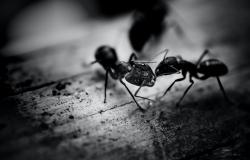Edward O. Wilson: A Brilliant Legacy with a Dark Warning

Scott Montgomery offers a questioning homage to the evolutionist E.O. Wilson who died on December 27th 2021.
On a glowing October day in 1976, I attended a talk by a Harvard biologist whose new book had caused a storm. The auditorium, full and buzzing, seated around 800, with a curving balcony above. Merely a moment into the lecture, angry shouts and yells poured down from this upper realm, drowning out the speaker, covering listeners in a sleet of vitriol. Many of us yelled back, appalled at the act of censorship. To no avail. The talk was canceled.
I still regret this lost opportunity to hear Edward O. Wilson deliver his theory of human nature while the ink was still wet. Wilson passed away on December 27, 2021, at the age of 92, leaving behind the image of a great public intellectual in the Victorian mold, noisily celebrated in the arena of popular honor, quietly debated behind closed doors. I, for one, was never among the noisy.
E.O. Wilson was a superlative evolutionary scientist, as well as a nature-centered activist of the first rank. His scientific achievements, in such areas as insect behavior, biodiversity, and island ecology, are world renown. Yet, I am among those who have never been comfortable with, and will never accept, his ideas on human beings. By this, I mean the deterministic grip he gives to biology in every aspect of mind and culture.
I am quite familiar with Wilson’s writings, as well as commentary, interviews, and more and humbly share a deep engagement with science, humanism, and the work of Charles Darwin (whose impact on modernity I’m currently writing about in a new book). There are only a few points I wish to make in this brief essay. I feel they can help qualify an overflow of heroification that does the complexity of Wilson’s thought an insufficient justice.
To this point, E.O. Wilson has been regularly knighted with the title of “Darwin’s natural heir” and “Darwin of the 21st century.” The 19th century Charles Darwin, however, made his name by writing scientific books mainly for scientists. Though Origin of Species was intended for a decidedly wide audience, its most desired converts were other scientists. More generally, Darwin did not seek, and in fact took pains to avoid, becoming a public intellectual; this he left to Thomas Huxley in Britain, Asa Gray in the U.S., and, above all, Ernst Haeckel in German-speaking countries.
Wilson wrote more than two dozen books for popular (educated) audiences. He gave abundant talks, lectures, and interviews, and he appeared on radio and television many times over more than four decades. While he did speak often about his biological work, more than half the time he was eager to discuss his ideas about society, the human mind, how culture is connected to genes, and related subjects.
But Wilson can’t be neatly compared to Darwin for a scientific reason as well. Darwin was a biologist and geologist—the combination was crucial—and made contributions to both fields. The alloy of these two kingdoms of knowledge is what rendered the five-year voyage around the world on the Beagle so immensely nutritive to his thinking and his theory. Darwin began this voyage, sailing out of Plymouth Harbor on December 27, 1831, with much more knowledge about the Earth and life upon it than any explorer in human history (even more than his own idol, Alexander Humboldt). It should be seen as significant that during the voyage, he wrote 1,383 pages of notes about geologic phenomena, compared to 368 pages on animals and plants. Origin of Species is a book restless with the imagery of a dynamic, changeable Earth, to which all life constantly struggles to adapt while also competing with itself.
My own difficulties with Wilson’s work return to his ideas about people. In the 2004 preface to On Human Nature, a book originally published in 1978, Wilson explains these ideas, forming the basis for his theory of human sociobiology (aka today evolutionary psychology), as follows:
[T]he brain and mind are entirely biological in origin and have been highly structured through evolution by natural selection. Human nature exists, composed of the complex biases of passion and learning propensities often loosely referred to as instincts. The instincts were created over millions of years, when human beings were Paleolithic hunter-gatherers. As a consequence, they still bear the archaic imprint of our species’ biological heritage. Human nature can thus be ultimately understood only with the aid of the scientific method. Culture evolves in response to environmental and historical contingencies, as common sense suggests, but its trajectories are powerfully guided by the inborn biases of human nature.
Such were bold words to bring forward in a decade when Freud and Marx bestrode the halls of academe and topics of racism and gender inequity had high voltage. To ensure the message was clear and a source of extreme weather in university culture, he repeated in this book the claim made a few years earlier in Sociobiology: The New Synthesis (1975) that the rule of genes meant “the humanities and social sciences shrink to specialized branches of biology.”
Examples of the attacks that Wilson underwent, including being drenched with ice water, are offered in the excellent obituary by Carl Zimmer. As he often does, Zimmer leaves a flow of well-chosen anecdote and fact to speak without any parental conclusions. Let it be said, however, that Wilson was never in doubt that his was the only answer about things human.
In the scene I describe above, terms like “racist monster” and “Nazi” were hurled at him like jagged stones. Such anger made sense to many on the left at the time. Laws allowing forced sterilization, dating from early in the century, remained on the books, while arguments that poverty, criminality, and gender roles are fixed by nature (or God) were still current in public discussion. Such ideas were being dismantled from many sides in the name of democratic progress and liberation.
Wilson marched into this environment with the confidence of a large, predatory mammal. His confidence had the appetite of the righteous. Human nature, he stated, is as real as blood and belongs to natural science. All other branches of knowledge must bow to this fact as a balance does to a weight. “[H]istory, biography, and fiction are the research protocols of human ethology; and anthropology and sociology together constitute the sociobiology of a single primate species.” It is the vision of a new kind of university, smaller, compact, labs in every building, a colony with students scurrying from one chamber to another, driven by intellectual pheromones.
That image may not be entirely fair. And yet, it is certainly true that Wilson wished to solve by imperial fiat the “two cultures” problem by making the arts and humanities entirely the servants of science. At the same time, Wilson’s theory was not without any subtlety. “Environmental and historical contingencies” were given significant influence, particularly on individual lives. But these contingencies, like culture itself, are on “a short leash” to genes.
These ideas never altered over Wilson’s long career. Despite some moments of defensive aggression (verbal), the man was not a racist or misogynist, nor an opponent of causes for social change. One of his ideas later in life was to return half the Earth’s surface to wilderness in order to preserve its biodiversity.
Was E.O. Wilson a eugenicist? Did he ever give this idea for social improvement, with all of its monstrous history, a seat at the table of the future? Let him answer in his own words:
In time, much knowledge concerning the genetic foundation of social behavior will accumulate, and techniques may become available for altering gene complexes by molecular engineering and rapid selection through cloning. At the very least, slow evolutionary change will be feasible through conventional eugenics. The human species can change its own nature. What will it choose? Will it remain the same, teetering on a jerrybuilt foundation of partly obsolete Ice-Age adaptations? Or will it press on toward still higher intelligence and creativity, accompanied by a greater—or lesser—capacity for emotional response?
This would be called, in historical terms, “positive eugenics.” It aims not at eliminating unwanted types of people but increasing the proportion of desirable genetic substance in the human collective. The problem, of course, has always been the belief that these can be kept strictly separate. Francis Galton, originator of eugenics, wanted to do this by marrying the most talented, athletic, attractive men and women, yet the intractable logic of the eugenic concept drew him to suggest those with disease, insanity, low intelligence, etc. be prevented from procreating.
Wilson is not Galton in a new suit. He easily dispenses with the Englishman’s theory of hereditary genius. Yet he only amends the eugenic concept. Writing in the 21st century, he is an unmistakable sign that eugenic thinking has never left the scene, and, though often only whispered in the shadows, it has made a return impelled by technologies able to identify embryonic “flaws” and re-engineer the genome itself. No one doubts the CRISPR-CAS9 system has brought a trembling new era. In the long history of the future, the eugenic vision may have only begun. What might be the role of the individual in it, or the state? Hard limits set by committees of well-meaning biologists can be turned to vapor by ambitious autocrats.
Tying E.O. Wilson directly to racist policies or fascism misreads, I think, his significance. How is it, after all, that his ideas of genetic determinism gained such renown in the world’s preeminent capital of individualism and liberal democracy? How is it, no less, that Wilson maintained a hero’s welcome from media and public sources for essentially proposing that most of the liberal arts be crushed to powder and used as plaster to decorate the mansions of science? Less than a decade after his first books appeared on human sociobiology, a series of new journals were founded on the subject. It later blossomed into the field of evolutionary psychology. Though Wilson’s fame in recent years was more due to his work as a naturalist and environmental advocate, his first Pulitzer Prize was for On Human Nature, quoted above, while Consilience (1998), which received much positive attention (some negative, too) details why science should absorb all other disciplines. There is something very interesting in all this gleaming eminence given to a man who essentially, and partly in disguise, rejects major portions of the liberal tradition in thought.
Science is his autocracy. Science, that is, as the explanatory power to triumph over all questions, problems, challenges, and doubts. He gave it a friendly sound: “scientific humanism” - the application of scientific methods to the study of all things human, with the goal of using results to achieve real, consistent progress in human society. Such was a core Enlightenment belief, and it has never lacked for adherents. I would even say it has a place, with some other primary ideas, near the heart of modernity itself.
Yet, as a student of the humanities might perceive, “scientific humanism” rhetorically begs its own inverse. What would a “humanistic science” be? It would be a more humble enterprise, no doubt, and would raise different questions. Above all, the question of who - who determines what “scientific methods” should be used to study humanity? Who will define “progress” and when it is achieved? Who will say when it will be time to pursue a scientifically humanized eugenics? Who should resolve the value and direction of universities? And so on.
This question of who decides, should we need reminding, has been among the most fundamental to emerge from the horrific wars, genocides, and ideological struggles of the past century. Can it be answered, once and for all, by science? We know what Edward Wilson would say. History—not yet a branch in the forests of biology—would offer a different answer.
Scott L. Montgomery is an author, geoscientist, and affiliate faculty member in the Jackson School of International Studies, University of Washington, Seattle. He has 25 years' experience in the energy industry, where he worked on projects in many parts of the world. His many technical publications include papers, monographs, articles, and textbooks, mainly focused on cutting edge hydrocarbon plays, technologies, related impacts and issues.
Photo by Syed Rajeeb from Pexels


